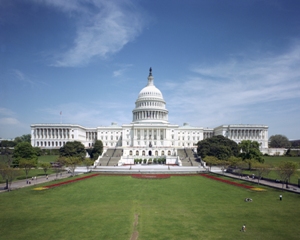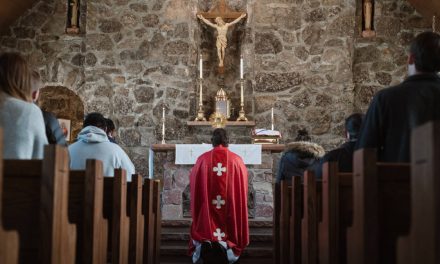
Courtesy of the Architect of the Capitol
Since converting to the Catholic Church in 2006, Lent has become a much anticipated time to recalibrate and get my bearings. My Lenten journey is defined by words such as simplification, detachment, sacrifice, devotion and a focused effort on improving my prayer life. This somewhat disciplined approach has worked well in past years, but this year I find myself continually distracted by the state of our country and the presidential political season. I am seeking peace, but find it to be an elusive goal this Lent.
Regarding peace (or the lack of it), have you noticed when politics enters into a conversation, many people become defensive or angry? I find this kind of conversation even more contentious when I observe our fellow Catholics engaging in political discussions when they have differing opinions. A recent political discussion I was involved in about the government’s attack on religious liberty is the motivation behind me wanting to share my thoughts with you on Catholicism and politics. I will attempt to offer some “Lenten discipline” to assessing challenges the Church faces in our country (USA) and suggest a Catholic response to these problems.
Opposition to Church Doctrine
We have an enormous problem with the lack of leadership and good example from politicians who are Catholic, but consistently make decisions and cast votes that are contrary to Church teaching. In the recent Senate vote on the Blunt Amendment which would have blocked the HHS mandate, 13 Catholic Senators voted against the amendment. Consistently and publicly, many Catholic politicians have taken pro-abortion and pro-gay marriage positions among many others which are counter to Church teaching. This administration, arguably the most pro-abortion in history, has dramatically increased the pressure and attacks on the Catholic Church with the complicit involvement of other Catholics. It is difficult to comprehend the reasons behind their failure to defend moral truth.
Guilt by Participation
What about the governed? What role do we play? Has our involvement in the political process promoted or opposed Catholic doctrine? Around the country, politicians are consistently being elected who hold positions that are in direct opposition to Catholic teaching on everything from abortion to basic religious liberty, with the active help and support of other Catholics. As Archbishop Chaput wrote in Render Unto Caesar, “American democracy does not ask its citizens to put aside their deeply held moral and religious beliefs for the sake of public policy. In fact, it requires exactly the opposite. People are fallible. The majority of voters can be uninformed or biased or simply wrong. Thus, to survive, American democracy depends on people of character fighting for their beliefs in the public square – legally, ethically, and nonviolently, but forcefully and without apology. Anything less is a form of theft from the nation’s health.” (p.146-147)
Four Big Problems (among many)
There are numerous reasons why Catholic politicians and voters are out of sync with the Church, but here are four we should consider:
- The failure to understand that the fundamental right to life has primacy over all other rights. As Blessed John Paul II explained in Christifideles Laici, no. 38, “Above all, the common outcry, which is justly made on behalf of human rights—for example, the right to health, to home, to work, to family, to culture — is false and illusory if the right to life, the most basic and fundamental right and the condition for all other personal rights, is not defended with maximum determination.”
- We are not to cooperate with evil and yet we still do. “Decisions about political life are complex and require the exercise of a well-formed conscience aided by prudence. This exercise of conscience begins with outright opposition to laws and other policies that violate human life or weaken its protection. Those who knowingly, willingly, and directly support public policies or legislation that undermine fundamental moral principles cooperate with evil.” (USCCB, Forming Consciences for Faithful Citizenship A Call to Political Responsibility from the Catholic Bishops of the United States, #31)
- We forget that we are made for Heaven, not this place. We are in the world, but not of the world. It is difficult to make good decisions and be courageous for our faith when we are distracted and consumed by materialism, technology addictions, selfishness and pride. “The big, blazing, terrible truth about man is that he has a heaven-sized hole in his heart, and nothing else can fill it. We pass our lives trying to fill the Grand Canyon with marbles. As Augustine said: ‘’Thou hast made us for thyself, and our hearts are restless until they rest in thee.’” (Dr. Peter Kreeft)
- We are often indistinguishable from secular society. In his excellent book, Render Unto Caesar, Archbishop Charles Chaput made this point, “Catholics have made themselves indistinguishable from their non-Catholic neighbors. They have the same virtues and vices. And this is why the culture isn’t more ‘Catholic’ or ‘Christian,’ even though Catholics make up 23 percent of the population. A kind of foggy worldliness has settled into the American Catholic soul. In effect, a great many Catholics keep the Catholic brand name, but they freelance what it means. The point is this: American Catholics now face a crisis of faith, mission, and leadership – and the task of fixing it falls equally on Catholic laypeople and their bishops.” (p.181-182)
What can and should we do?
Here are five actionable ideas:
- Pray that all of our political leaders respect the dignity of all human life and make the right decisions for our country and uphold the Constitution.
- Pray for our Bishops and actively join them in the fight to uphold religious liberty and defend the Catholic Church from persecution.
- We must strive to have well-formed consciences. The Catechism says, “Conscience is a judgment of reason whereby the human person recognizes the moral quality of a concrete act that he is going to perform, is in the process of performing, or has already completed. In all he says and does, man is obliged to follow faithfully what he knows to be just and right.” (no. 1778).
- Don’t sit on the sidelines. The Catechism reminds us, “It is necessary that all participate, each according to his position and role, in promoting the common good. This obligation is inherent in the dignity of the human person. . . . As far as possible citizens should take an active part in public life.” (nos. 1913-1915).
- We live in a difficult time as Catholics. Courage and sacrifice will be required. Quoting once again from Archbishop Chaput in Render Unto Caesar, “The time for easy Christianity is over. In fact, it never really existed. We’re blessed to be rid of the illusion. We need to be more zealous in our faith, not more discreet; clearer in our convictions, not muddier; and more Catholic, not less.” (p.53)
So, there it is. I have shared a stripped-down and basic version of the political landscape and a few of our obligations through my Lenten filter. I didn’t cover everything, but I hope we will all take the initiative to be better informed about what our Catholic faith teaches us regarding our involvement in politics and the public square. I strongly suggest reading the USCCB document, Forming Consciences for Faithful Citizenship and the book, Render Unto Caesar, by Archbishop Charles Chaput. The Bishops’ document is a very thorough explanation of our civic duty as Catholics, strongly supported by Scripture, the Catechism and papal writings. Archbishop Chaput’s book is a call to action that will permanently change your view of our Catholic responsibility in the public square.
The Church needs us to be actively involved and authentically living out our Catholic faith. Let’s discern carefully the future choices we will have before us in the voting booth and in defending our faith in the public arena. Through prayer, the guidance of the Holy Spirit, faithfulness to the Magisterium and devotion to the Eucharist we will draw closer to Jesus during Lent and be well prepared for the battles ahead.
Randy Hain, Senior Editor for The Integrated Catholic Life™, is the author of The Catholic Briefcase: Tools for Integrating Faith and Work which was recently released by Liguori Publications. The Catholic Briefcase is available on Amazon, Barnes & Noble online and your local Catholic bookstore.
The Catholic Briefcase was recently selected as a Finalist in the About.com Catholicism Reader’s Choice Awards for the Book of the Year for 2011. You can vote for The Catholic Briefcase here: About.com Catholicism Reader’s Choice Awards
Please help us in our mission to assist readers to integrate their Catholic faith, family and work. Tell your family and friends about this article using both the Share and Recommend buttons below and via email. We value your comments and encourage you to leave your thoughts below. Thank you! – The Editors














